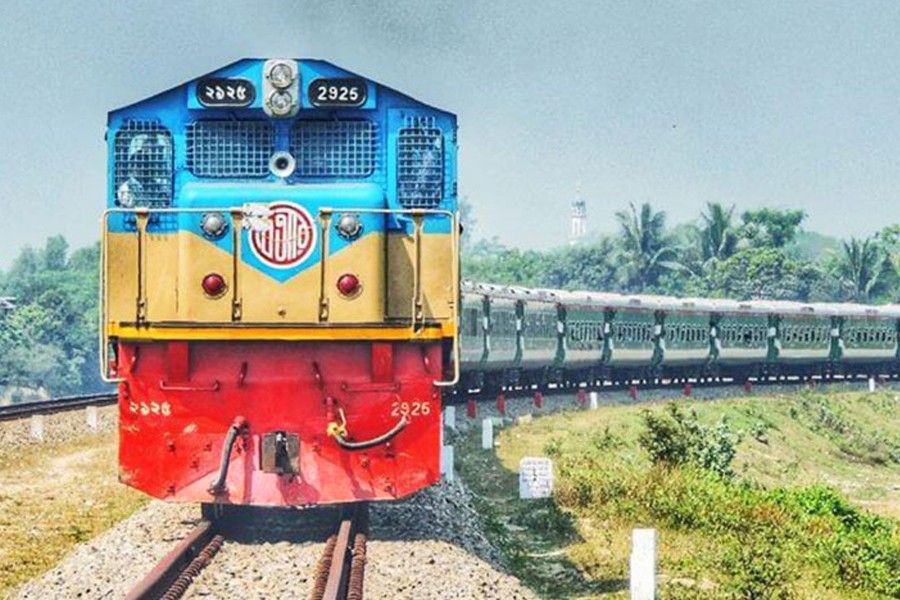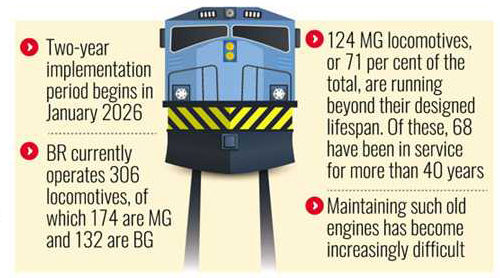China to provide Tk 15.91bn grant for 20 MG locomotives
New engines expected to replace aged fleet, cut operational costs, and ensure safer, more reliable train services

Published :
Updated :

China has agreed to provide a Tk 15.91 billion grant to Bangladesh for procuring 20 meter-gauge (MG) locomotives for Bangladesh Railway (BR).

The initiative aims to replace aged engines and ease the acute shortage of locomotives that has been crippling train operations for years, said officials concerned.
The Ministry of Railways has forwarded a proposal, titled "Procurement of 20 Meter-Gauge Diesel Electric Locomotives for Bangladesh Railways under China Grant," to the Planning Commission and the Economic Relations Division (ERD).
The ERD and the Planning Commission have initiated necessary steps to expedite the approval process of the Preliminary Development Project Proposal (PDPP).
According to the PDPP, the estimated cost of the project is Tk 16.35 billion (around $133.12 million). Of this, Tk 15.91 billion ($129.54 million) will come as a grant from the Chinese government, while only Tk 440 million ($3.58 million) will be sourced from the domestic resources.
The project has been designed for a two-year implementation period, starting in January 2026 and ending in December 2027.
Alongside the delivery of 20 new locomotives, the scheme includes the supply of spare parts, equipment, and training facilities to ensure technology and knowledge transfer for Bangladeshi engineers and mechanics, said officials.
The PDPP reveals that the Bangladesh Railway currently operates 306 locomotives across its network, of which 174 are MG and 132 are broad gauge (BG). However, the majority of the MG fleet has already exceeded its economic life of 20 years.
Official documents reveal that 124 MG locomotives, or 71 per cent of the total, are running beyond their designed lifespan. Of these, 68 have been in service for more than 40 years, while 84 have crossed 30 years of operations.
Railway engineers said that maintaining such old engines has become increasingly difficult.
Spare parts for outdated designs are scarce and often need to be imported at high cost, while breakdowns are frequent. Fuel consumption has also risen due to poor efficiency, pushing up operational expenses.
"The maintenance and repair costs of these old engines are disproportionately high compared to their output," said a senior BR official. "Reliability has dropped so much that delays and cancellations have become unavoidable in some cases," he added.
Officials warned that if new locomotives are not procured urgently, BR may be forced to suspend operations in some MG sections, particularly in the eastern zone where demand is high.
Demand outpaces supply:
The shortage of locomotives has already become evident in daily operations. According to the Working Time Table (WTT-52) published in January 2020, the MG sections in Dhaka, Chattogram, and Lalmonirhat divisions required 203 locomotives, including a 25 per cent maintenance reserve.
At present, BR has only 182 locomotives in active service, leaving a gap of at least 21 units. Officials stressed that the actual shortage is greater because passenger and freight demand has grown steadily since 2020.
Freight and local trains are the worst affected by the shortfall, as BR prioritises scarce locomotives for long-distance intercity passenger services.
Moreover, the shortage means many locomotives cannot be released for scheduled overhauls, which in turn worsens breakdowns and further reduces availability.
National development targets at risk:
The procurement project is regarded as crucial to achieving the government's 8th Five-Year Plan targets, which aim to raise BR's share in passenger traffic to 10 per cent and in freight traffic to 15 per cent. The Railway Master Plan had recommended procuring 74 replacement locomotives and 37 additional ones during its first phase (2017-2021). However, only 30 units have been procured so far, creating a significant gap in the fleet.
An earlier plan to procure 70 MG locomotives under tender-based financing was abandoned in 2011 due to a funding crisis, leaving BR to rely on its increasingly fragile MG fleet.
Efficiency, safety, and growth
Railway officials said the 20 new Chinese locomotives would help BR introduce new passenger and freight services, reduce maintenance downtime, and cut fuel costs.
The modern engines are expected to ensure safer, more reliable operations and generate higher revenue. "The shortage of locomotives has forced BR to ration services and delay maintenance schedules," an official noted. "The Chinese grant will provide much-needed relief, but the overall requirement remains much higher."
Transport experts echoed the view, pointing out that while the grant-funded procurement is a positive development, BR will need to invest far more in both meter-gauge and broad-gauge locomotives to achieve its long-term targets and keep pace with rising demand.
With over two-thirds of its MG locomotives already past their economic life, timely replacement has become essential not only for improving efficiency but also to prevent service disruptions in key corridors. Without new engines, BR risks losing credibility as a dependable transport provider in both passenger and freight markets.
jahid.rn@gmail.com


 For all latest news, follow The Financial Express Google News channel.
For all latest news, follow The Financial Express Google News channel.